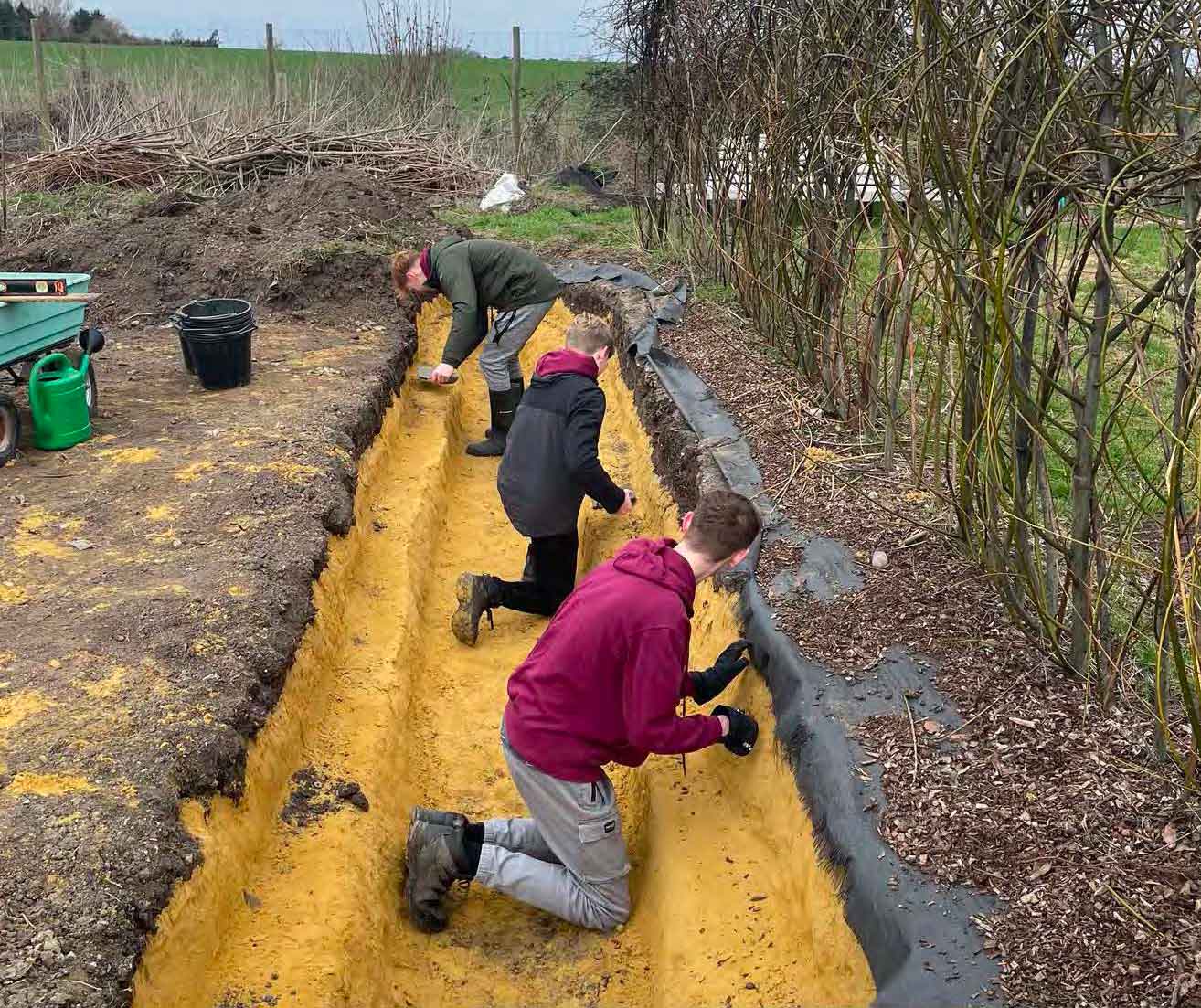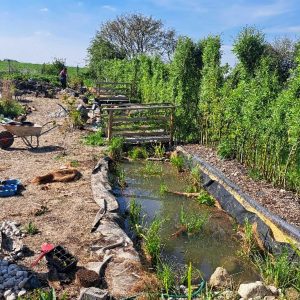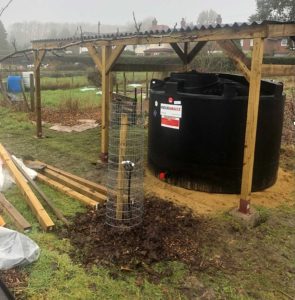Project Background
At Lindengate we have a heritage orchard positioned on a heavy clay soil surrounded by cultivated fields. Our heritage orchard and the adjacent fields have a sloping gradient. Heavy rainfall leads to saturated soil, depleting the soil structure. This geographical topography leaves our fruit trees vulnerable to stress and disease. When soil becomes saturated, plants cannot develop fine feeder roots that are responsible for the uptake of nutrients and strong roots to anchor the tree. The Lindengate orchard is a new orchard and young trees take time to develop a good root structure. Sitting in water prevents a tree’s ability to achieve this. Plus, in a poor soil systems trees are prone to upheaval and wind rock, leading to toppling. Poor soil breaks down the delicate healthy soil structure and impacts on the fauna and flora of the area, decreasing wildlife. Good drainage can prevent problems in the future.
The adjacent willow ‘fedge’ also benefits from the water run off from the field. Newly planted willows benefit from a strong water resource. By only lining the lower part of the swale, excess water can be soaked up by the willow roots through osmosis and drawn up through the tree by capillary action. Through clay and chalk banks, excess water that is not used by the plants, can run successfully into the swale lined bottom where it can be stored.
In the summer we also suffer the long periods of drought which again impacts on the wildlife, soil and trees of the area. Lindengate is conscious to conserve our precious water resources building a greener future, especially in light of climate change. Already on site we capture water from our buildings in our ponds and ditches, and store water in water containers. However, everyone can do more to preserve our precious water resources. By creating the swale in the Lindengate heritage orchard, adjacent to our pond, the excess water is captured and stored. This process not only benefits our trees and soil but creates a year round rich habitat for aquatic invertebrates, wetland plants, amphibians, attracting mammals and birds. The swale enhances Lindengate’s ability to create biodiversity on site. By stabilizing the sediment, water clarity increases too.
Drainage swales are shallow ditches with sloping sides that merge in with surrounding landscape design. Our swale is purpose designed to facilitate water management and encourage irrigation. The heritage orchard swale takes advantage of the orchard’s geographical slope. Water runs off the fields, downward into the soil below the willow ‘fedge’, preventing our heavy clay soil becoming saturated. The creation of the Heritage Orchard Swale captures and harvests water on site and enhances our wildlife corridors.
The Swale is lined to a height of 40 cm under the access bridges used to enter the side of the orchard. The use of a sympathetic liner will enable us to capture the water all year at the bottom of the swale. Also, any overspill water from our orchard pond can run into the swale.
Project Objectives
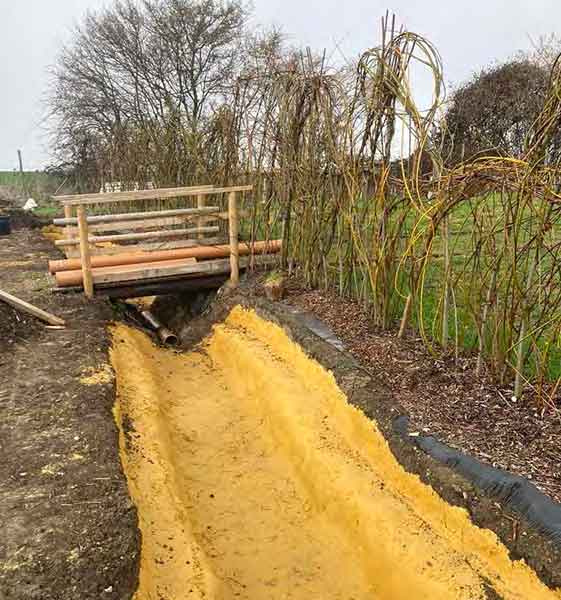
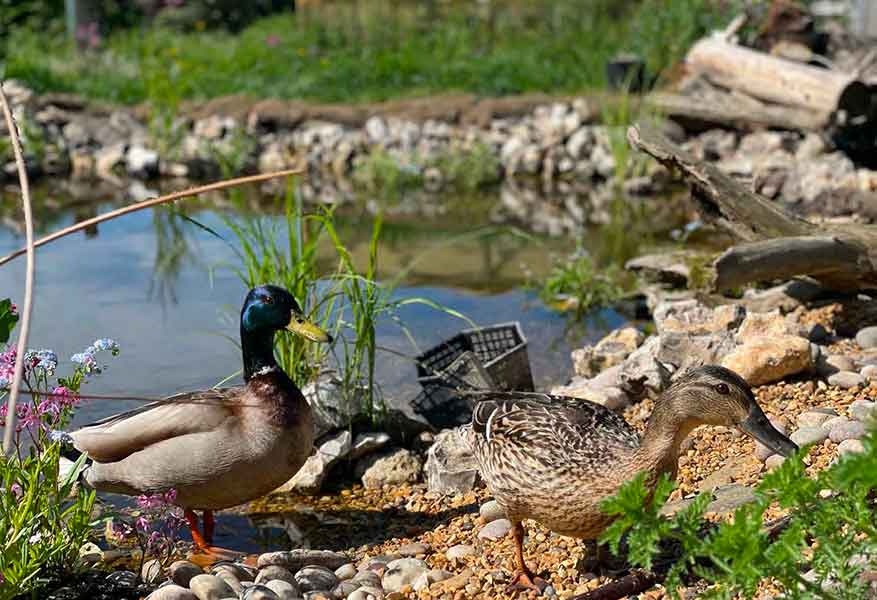

The Heritage Orchard Swale Project set out to achieve the following objective:
WATER
To create a smarter way to capture the water on site.
NATURE
To create a haven for water lice, spiders, damselflies, dragonflies, frogs and newts enhancing the aquatic plants, native wildflowers, and grasses increasing our insect and pollinator populations, promoting and enhancing biodiversity and supporting the pollinators for the orchard trees.
PEOPLE
Through the provision of nature based activities empower people to nurture their wellbeing, connect to nature and respect the environment.
Project Themes
MANAGING FLOW
The swale prevents flooding and captures the rain water during the dry season creating a wildlife aquatic habitat.
WATER QUALITY
Aquatic plants grown in aquatic, heavy loam coir/hessian soil rolls, sited on low planting ‘shelves’, either side of the sloping banks hold in the nutrients that could otherwise be used by algae. Plants soak up pollutants and make the swale attractive to wildlife. The use of shingle at the base of the shale, carefully sourced rocks and logs around the edges create habitats for invertebrates and insects.
WILDLIFE CORRIDOR
The swale is designed to support aquatic plants at the base and lower shelves. Wildflowers, grasses and plants will flourish across the swale slopes, banks and wildflower beds. This is to encourage pollinators, insects and birds, enabling our adjacent heritage orchard to thrive. At Lindengate, we believe if you nurture nature it will nurture us. The swale is a link to the wildflower banks that line the orchard, enhancing our wildlife corridors that continue from the top orchard to the bottom of our site within the nature reserve. Once the swale and planting are completed and established, wildlife and ID surveys will be conducted seasonally and yearly so we can monitor the species and water health in the location.
WORKING TOGETHER
Lindengate’s vision is ‘Better health and wellbeing for all through nature.’ Through the provision of nature-based activities we empower people to nurture their wellbeing, connect to the healing power of nature and respect the environment. Our values are to nurture, collaborate, pioneer, empower and respect. We run all-age, fully-integrated nature-based, therapeutic programmes to support wellbeing and low-to-moderate mental health needs. Our programmes cater for people from secondary school age right through to those facing dementia and memory loss, with programmes designed to support a range of mental health needs in between, such as work-related stress, loneliness and isolation, and common mental disorders such as depression and anxiety. Our beneficiaries include young people who are disengaged from education, young carers, 18-24-year-olds seeking transferable skills for work, NHS staff working on the frontline of critical care, women from minority ethnic communities, conservation and corporate groups. Specialist group-led nature-based activities, therapeutic gardening, conservation, horticulture, or craft & construction activities help people to foster resilience and enjoy strong community value and acceptance, while ‘Open Garden’ sessions are open to all. Creating the swale has drawn on the abilities and resilience of our staff, participants, volunteers and the volunteens (13 – 18 year olds).
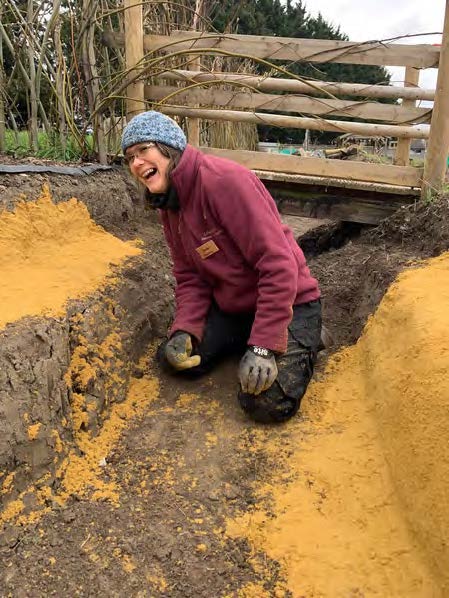
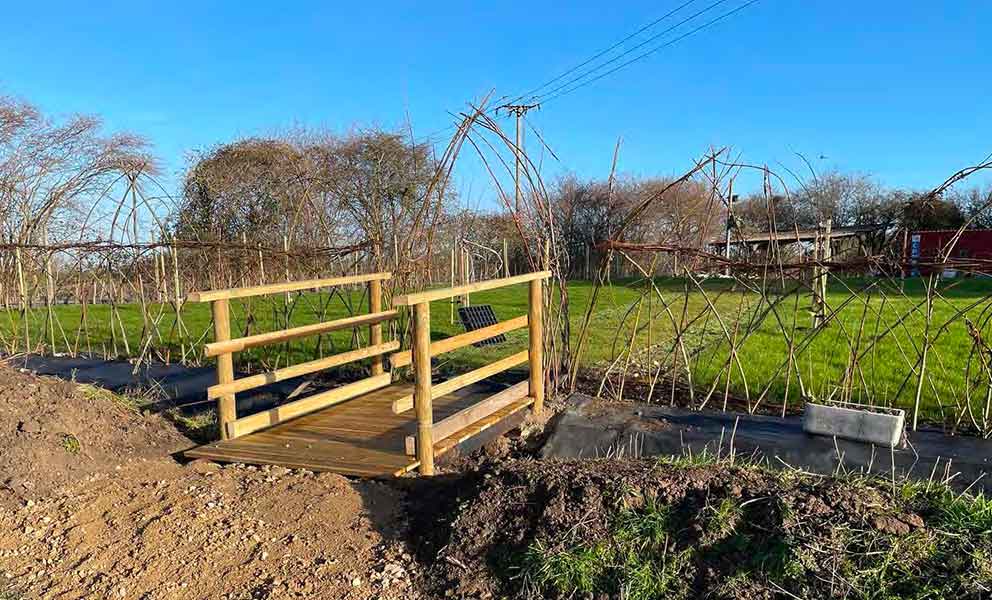
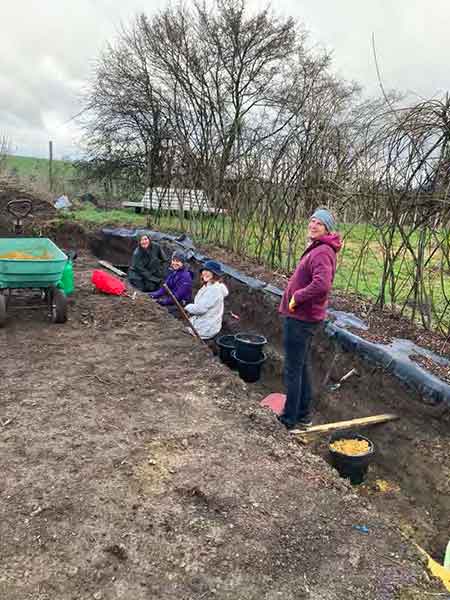
Lindengate’s 6-acre biodiverse, sustainable nature reserve and gardens, have been transformed by community action through almost 10 years from a derelict allotment. Now the site is holistically linked to the communities of which they are a part. The completion of the swale is the final stage of the creation of a healthy and sustainable heritage orchard site.
“Prior to attending Green Volunteens, I had suicidal thoughts, which I don’t have any more”
“It’s an absolutely amazing place to be, the thing I look forward to each and every week”
“Lindengate has been amazing for me as I don’t get out much. It has been a lifeline for me and connection to the outside world”
INVOLVING PEOPLE
The local community is at the heart of Lindengate. We currently have 200 regular volunteers that complement our small staff team, creating a wildlife haven across our 6-acre nature reserve, tree nursery and gardens, supporting our programme beneficiaries through excellent peer support, and developing our national conservation and policy initiatives. Lindengate would simply not be a viable charity without the powerful social action and commitment provided by our volunteers. Many of our volunteers have lived experience of mental health challenges themselves and the majority tell us that volunteering at Lindengate and connecting with nature helps them to improve their own mental health.
In 2022, Lindengate was awarded the Queen’s award for Voluntary Services and the Green Flag award.
While Lindengate delivers its wellbeing services locally and regionally, our community-fuelled conservation programmes have national reach, supporting the reintroduction of endangered native species into biodiverse landscapes nationwide, for example, Lindengate is home to the largest clone bank of Black Poplar trees in the UK and is renowned as the leading expert. In 2021 we were honoured by a request from the Greater London Lieutenancy to supply a Black Poplar and attend its ceremonial planting in Regent’s Park in honour of the Queen’s Platinum Jubilee.
Project Progress
Due to heavy rainfall in November and the freezing temperatures in December 2022 which froze the soil, the creation of the swale did not commence until the middle of January 2023, later than we anticipated.
In March, we have been managing freezing temperatures and heavy rainfall. One again, the swale has filled with water before the project is completed. The swale is doing what it is supposed to do. This is good news. We are capturing the water. In terms of completing the project the weather has impeded the success of fulfilling our completion date at the end of March. The ditch remains either full of water or frozen. Therefore, we do not anticipate the project will be finished until April 2023. At Lindengate we appreciate the importance of working with nature and working with the elements this year is certainly the way to progress this project forward successfully.
Tasks Completed

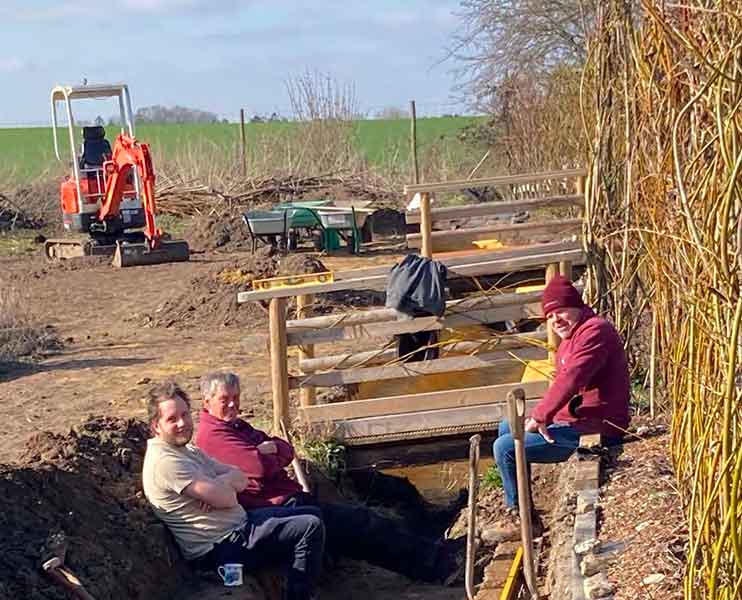

Tasks completed during the period 16th January to 10th March:
- Soil dug to a new depth of 80 cm
- Swale widened to a new width of 180 cm
- Soil from the swale moved to new areas of the site
- Two adjacent flower banks prepared
- Swale lined with soft sand
- Pond liner placed to a depth 40cm
- Aquatic soil and rolls prepared for marginal aquatic plants
- Information boards currently being designed and ordered through Landmark and stands being created at the Lindengate wood workshop by our staff and volunteers
- Shingle and rocks delivered to site
- Wildflowers and seeds purchased
- Aquatic plants purchased
- Grasses and plants purchased.
Staff & Volunteers
Staff and volunteers have worked alongside each other on this project:
Young People: Our Green Volunteens (13-18 year olds) have supported the project. 18 young people have spent two Saturday mornings (54 hours) moving earth and sand.
Volunteers (adults 18+): A team of 10 volunteers have spent 32 hours digging, lining, moving soil and sand.
Wellbeing Programme Participants: Each week people with low to moderate mental health challenges attend programmes at Lindengate. As part of their activity schedule the groups have spent 3 hours (one session) planting up wildflowers and aquatics.
Staff : The project has been coordinated and led by the staff team. 3 staff have spent 150 hours organising deliveries and schedules, digging, lining, moving soil and sand.
Looking forward
Although Lindengate anticipates that the completion of the swale will continue into April, the management of the budget will be completed by the end of March. The project’s key themes and objectives are already being met by working with the challenging environmental conditions. The swale is successfully capturing the water, preventing site flooding and erosion. The creation of the Heritage Orchard Swale, made possible through the generous support of the River Chess Smarter Water Catchment project and the Chiltern Society, has brought together our community partners, participants, volunteers and staff in the creation of this import community and conservation project.
Written by Andy Grant
Lindengate Mental Health Charity, Aylesbury Road, Wendover, Bucks, HP22 6BD.
Tel: 01296 622443. Web: www.lindengate.org.uk
Registered as a charity no. 1153868

